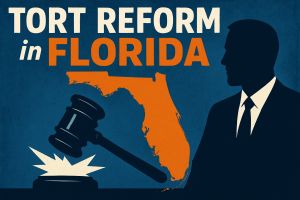
Florida homeowners are aware that insurance costs can be a significant financial burden. Many families struggle with rising bills each year. Recently, new tort reform laws have aimed to change that. Lawmakers believe these changes will lower insurance costs for many. As a result, more people might finally get relief from expensive premiums. Understanding how these legal changes work can help you see why rates are dropping. In the article below, you will learn about the laws, the reasons behind high insurance rates, and how reform is making a difference. You will also read real stories at https://floridainsurancequotes.net/florida-homeowners-insurance/ from Florida homeowners and get a look at the future of home insurance in the state.
Florida’s New Tort Reform Laws Explained Simply
Florida’s new tort reform laws focus on reducing lawsuits and legal costs. Lawmakers designed these reforms to stop some of the lawsuits that drive up expenses for insurance companies. Under the new rules, it is more difficult for individuals to file certain lawsuits against insurers. For instance, the laws set stricter requirements on when and how lawsuits can be brought. Because of these changes, insurance companies now face fewer court battles.
Additionally, the reforms limit the types of attorney fees that can be claimed in insurance cases. Before the new laws, attorneys could collect hefty fees for handling claims. Now, the laws cap these fees, making it less profitable to file questionable lawsuits. By reducing the financial incentives for excessive legal action, the system becomes fairer for all parties involved. Consequently, insurers do not need to factor so many legal costs into their premiums.
Another key part of the law includes new deadlines for filing claims. Homeowners must now report damages sooner than before. Because the claims process moves more quickly, disputes are resolved more efficiently. As a result, insurance companies can better predict their costs and risks. Over time, this stability helps lower the cost of insurance for homeowners across Florida.
The Connection Between Lawsuits and Insurance Rates
Insurance companies set their prices based on the risks and costs they expect. When they have to pay out for many lawsuits, their costs rise. As a result, they often increase premiums to cover these expenses. In Florida, the number of lawsuits related to home insurance was unusually high. Other states did not see as many claims or legal battles.
Therefore, insurance companies began charging Florida homeowners much more than people in other states. Every time a lawsuit is filed, legal expenses, claim payouts, and settlement costs go up. All these extra costs get passed along to everyday people through higher premiums. When lawsuits decrease, insurance companies incur fewer expenses, allowing them to lower their rates.
Many companies even stopped offering home insurance in Florida because legal risks were too high. Because of the reforms, more insurers may return to the market. When more companies compete for customers, prices tend to decrease. Fewer lawsuits mean better stability for insurance providers and more savings for Florida families.
How Recent Changes Are Saving Homeowners Money
According to https://floridainsurancequotes.net/florida-homeowners-insurance/, recent tort reform laws are already having an impact on insurance bills. Many homeowners have reported lower premiums and more choices. Fewer lawsuits mean insurance companies can offer better deals to their customers. Since the risk of unexpected legal costs has decreased, insurers can concentrate on delivering high-quality coverage.
Homeowners who stayed with the same company are noticing smaller rate increases. Some even received letters about reductions in their annual premiums. Others are seeing their deductibles drop or their coverage options expand. When insurers do not have to budget for so many lawsuits, they can pass those savings on to their clients.
Additionally, the reforms are helping to attract new insurers to the state of Florida. More companies in the market create a healthy level of competition. As a result, companies try harder to win customers by lowering rates or offering better service. Consumers now have more power to shop around and find the best deal for their needs.
Real Stories: Lower Insurance Bills Across Florida
Many Floridians have noticed smaller insurance bills for the first time in years. For example, a family in Tampa saw their annual premium drop by several hundred dollars. After years of steady increases, the savings provided them with much-needed breathing room in their budget. Because of the reforms, they no longer worry as much about future surprise hikes.
Another homeowner in Orlando shared her story about switching providers after the changes took effect. She found three companies willing to give her a quote, compared to only one last year. Competition between insurers led to lower premiums and improved customer service. People in Miami and Jacksonville also report more affordable options.
Community groups have begun discussing these changes at local meetings. Neighbors talk about how easier it is to afford home insurance now. More people are considering homeownership because they view insurance as a less significant barrier to entry. The reforms have brought a new sense of hope for many families across the state.
Potential Drawbacks and Ongoing Challenges
While tort reform has led to many benefits, not everyone is happy. Some consumer advocates worry that it could make filing legitimate claims harder for homeowners. Because the new laws impose stricter rules for making claims, there is concern that some individuals may struggle to obtain help when they need it most. Others fear that insurance companies might deny valid claims more often.
Additionally, some lawyers say the reforms limit access to the courts for everyday people. They argue that bad actors might still find ways to abuse the system, while honest homeowners face new hurdles. For some families, even minor disputes could now become more complicated or expensive to resolve. Balancing the need for lower premiums with fair treatment for all remains a challenge.
Looking ahead, the state must closely monitor the situation. Lawmakers will need to ensure that the system remains balanced as the market evolves. Ongoing oversight will help protect both consumers and companies. Everyone wants to see stable, affordable insurance, but not at the expense of fairness or quality of coverage.
Looking Ahead: The Future of Home Insurance Costs
As the effects of tort reform continue to ripple through Florida, many people are watching to see what comes next. Homeowners hope that the recent relief from high insurance costs will last. Insurance companies, for their part, are reevaluating their business models and looking for new ways to serve their customers. As the legal environment has become more predictable, more insurers are likely to enter the Florida market in the years to come.
Overall, more competition is likely to keep prices in check. Homeowners can expect a broader range of coverage options and improved customer service as insurers strive to differentiate themselves. However, everyone needs to remain vigilant about how the system works. Lawmakers will need to adjust the rules if they see new problems or unintended consequences.
In the long run, striking a fair balance between affordable premiums and robust consumer protection will ultimately benefit everyone. Trust between insurers and homeowners can grow as both sides see the benefits of reform. If the state continues to monitor the results and respond quickly to new challenges, the future of home insurance in Florida looks promising.
Conclusion
Tort reform in Florida has brought much-needed relief to many homeowners by reducing the number of lawsuits and associated legal costs. As a result, insurance companies can now offer more affordable rates, and competition is increasing in the market. Many families are already seeing real savings on their premiums, giving them more breathing room in their household budgets. However, some challenges remain, especially for those worried about access to fair claims and the potential for unintended consequences. By closely monitoring the system, lawmakers and regulators can help ensure that reforms continue to benefit all parties. Homeowners need reliable coverage at a fair price, and insurance companies need a stable business environment. The progress so far shows that meaningful legal changes can make a difference for everyday people. As Florida moves forward, the hope is that reform will create a stronger, more affordable insurance market for years to come. Everyone in the state will benefit if lower costs and quality coverage remain the top priorities. With the right balance and continued oversight, Florida’s homeowners can look forward to a more secure and affordable future.





